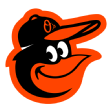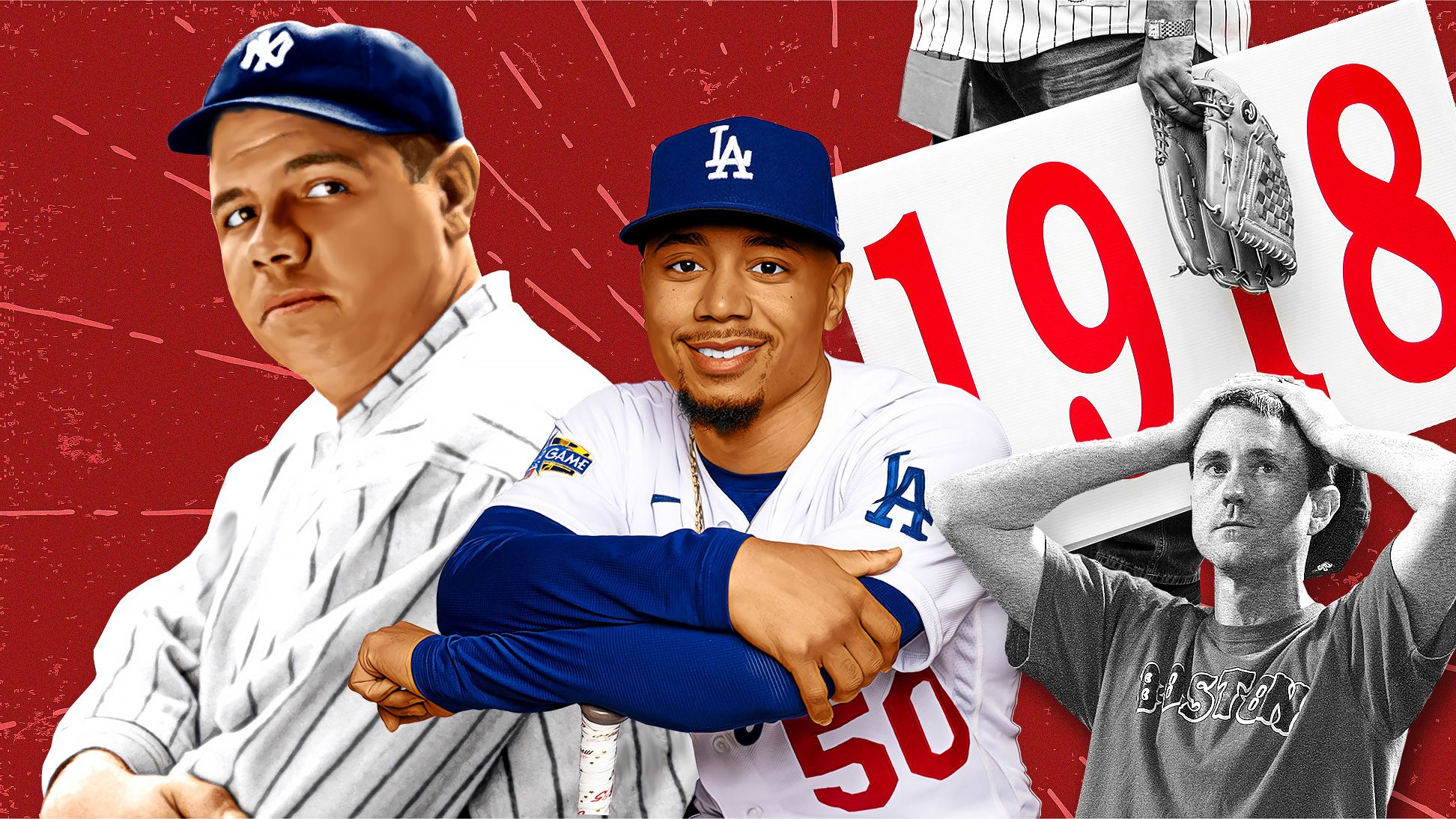The first time anybody talked about “The Curse of the Bambino,” according to newspaper databases, was in 1989, when buzz started to build about an upcoming book of that title by Boston sportswriter Dan Shaughnessy. Before that, there had been scattered talk of the franchise curse, perhaps kicked off by this 1978 Red Smith column in The New York Times.
Smith tossed off the theory casually, a kicker to his column about the club’s struggles on the road. But by 1986, when the Red Sox lost the World Series after a shocking and original sequence of flubs, the players had to answer for superstition: “I don’t believe in that,” reliever Joe Sambito said. “You can toss that to me, but I just throw it away as trash.” Whether you throw it away as trash is irrelevant — the key thing we’re talking about here is timing. Eighty-six years of Red Sox history would be consumed by a curse that, apparently, simmered unidentified for nearly 60 years, impenetrably resisting the club’s efforts without so much as a peep — until, one day, it was the loudest thing in the room.
A curse is a story told in both the past tense and the present, since the bulk of a curse’s life exists before it’s identified. The 20th-century Cubs weren’t realized to be cursed (by a resentful billy goat owner) until the 1970s, though the curse was presumed to have been active for decades. The 20th-century White Sox were, for a while, considered cursed (because of their 1919 scheme to throw the World Series) to never win the pennant, and then they “broke” the curse in 1959. Much later, it was realized that they had, in fact, been cursed not to win the World Series. The 1959 victory meant nothing to the curse, though it took more decades to figure that out.
A Curse of the Bambino column in, say, 1923, would have seemed frivolous. And yet the power of a Curse of the Bambino column in 2004 depended on the presumption that the curse had been active and working for decades, just as strongly in 1923 as in 2003.
There is no active curse that has been identified that can rival those of the Bambino, the billy goat and the Black Sox. But there will be, about a curse that will be seen in retrospect to have been active right now. It took about 60 years of losing for the Red Sox and Cubs to get their curses, and in a more crowded league it might well take a century for a team to earn the badge of cursedness. But in 30, maybe 50, maybe 150 years, they will write about The Curse of _________ to explain why the __________ __________ haven’t won a World Series in decades.
Let’s examine — counting down from least to most plausible — what evidence we have for an active curse for each team.
Jump to:
In a century, we’ll be talking about … | In a half-century, we’ll be talking about … | In a few decades, we’ll be talking about … | Any year now, we’ll be talking about … | They’re probably cursed already

In a century, we’ll be talking about …

30. Washington Nationals: The Curse of Grandpa Shark
It took 4,615 Red Sox losses (after the Babe Ruth trade) for Red Smith to identify their cursedness. Since their World Series title in 2019, the Nationals have so far lost 12. It’s true that they have lost something in the past few months, since the strange 2020 season probably costs them more baseball fun (in celebrations, giveaways, boosted attendance) than it costs any other team. But the Nationals are, relative to the worldwide pain of this year, merely inconvenienced. If they’re cursed at all, it’s that they suffered the extremely minor curse of winning their one World Series the year before a pandemic, instead of in 2018, 2017, 2016 — some season in which they could really backstroke in the glory of it.
Here’s a good time to note that there are different types of curses in the curse literature:
1. The person who gets just what they want but must then pay greatly for it (as in the case of deals with devils and wishes granted by sneaky genies).
2. The person who does something awful and is punished with a curse that lasts forever (as in the case of Sisyphus) or until atonement (as with the prince who was turned into the Beast).
3. The person who angers some malevolent force and is cursed by that malevolent force (as, for instance, Sleeping Beauty).
4. The person who is cursed for reasons of simple, perhaps arbitrary bad luck (as with Tecumseh’s Curse, or Job).
The Nationals almost certainly aren’t cursed by the departure of Gerardo Parra and his earworm walk-up music. If they are, the curse is so poorly developed and understood that we couldn’t even really place it in one of these four categories. But in most of the cases of potentially cursed franchises, the category is much clearer, as you’ll see.

29. San Francisco Giants: The Curse of Mike Jirschele’s Secret Regrets For Not Sending Alex Gordon in the 2014 World Series
Curses are, of course, not real. What gives them their power is the sense after whole eras have passed that a team’s historical successes are also not real, but just some long-ago folklore.
That fade doesn’t happen at once, but in stages: First, the last players from a championship team retire, and at the reunion events they no longer look like athletes. Then, enough time passes that fans born after the most recent championship reach adulthood, and they start raising new fans, and all those fans — the parents and the kids alike — have no trained memory of what winning a championship feels like. Then, those fans who were born after the most recent championship reach senescence, and they start to contemplate the possibility that their cheering lives will end unfulfilled. At that point there is no longer any presumption of good days ahead — in fact, it’s the opposite. Along the way, technology changes so much that the highlight videos and celebratory front pages from the team’s most recent championship (if it even exists) look decrepitly outdated, as old as King Arthur. It doesn’t just take a lot of losing to feel cursed, but the slow depletion of collective memories.
Right now, the Giants — who most recently won the World Series in 2014, with the Royals’ Alex Gordon stranded on third base — still have active players on their team from their third-most-recent World Series champion.

28. St. Louis Cardinals: The Curse of Albert Pujols
The Cardinals’ current World Series drought — eight whole years! — has included eight winning seasons, five postseason appearances, one World Series appearance and (aside from some bad managerial decisions) few losses that were egregiously painful. And Albert Pujols has completely vindicated the Cardinals’ decision to let him walk away after their most recent World Series, in 2011.
Still, that was an era-shifting decision for the club, and the era since hasn’t produced the typical, on-schedule Cardinals championship.

27. Atlanta Braves: The Curse of Ronald Acuna Jr.‘s Miffed Manager
It’s been a quarter-century since Atlanta won a World Series, but as with the Cardinals, not every drought can be called a curse. I simply can’t spin the years from 1996 to 2019 as cursed. So if these Braves are going to end up being called cursed, it will arguably have to be a curse that started in the very recent past. For example, when the team unfairly criticized Ronald Acuna — its own guy, and its best guy — for admiring a fly ball that didn’t quite make it out of the park in their 2019 playoff series. Maybe that set off the curse. The Braves did lose the series.
(Alternately, if you think blaming Acuna for not running hard wasn’t unfair, well, hey, you get to unfairly blame the curse on him.)

26. Chicago Cubs: The Curse of Kris Bryant‘s Service Time
The Cubs famously kept Kris Bryant in Triple-A to start the 2015 season, though it was clear to all that he was at least one of their two or three best players. They did it so that they could stall his service time and collect one extra year before his free agency. Or, in other words, they messed with a very deserving young man’s career so that they might have a better chance to win a World Series in 2021.
They might still win that World Series, and if they do, they won’t have been cursed after all. But every year since the 2016 World Series has been worse for the Cubs than the one before: National League Championship Series loss, then wild-card game loss, then missed playoffs — though, in fairness, they’re doing well early this season. The 2021 Cubs are not what you’d call a favorite to win it all, and Bryant isn’t a sure bet to be there in 2021, anyway.

25. Kansas City Royals: The Curse of PECOTA
The Royals famously beat the projection systems on their way to capturing three consecutive winning seasons, two consecutive American League pennants, one World Series title, and America’s heart. Three wishes granted nearly always come with a curse on the back end, and the Royals were nearly 100 games under .500 in the four full years since.
PECOTA — which has been off by only seven wins, total, in those four seasons — is getting its cursed revenge.

24. Toronto Blue Jays: The Curse of Doug Strange
The Blue Jays won the World Series in 1992 and 1993, so 1994 was a chance to do something only two franchises (the Yankees and the A’s) have ever done: three titles in a row. On April 27, they were in first place, and in the first inning they jumped ahead of the Rangers 2-0. But in the bottom of the inning, the Rangers answered with three runs, capped off by Doug Strange’s two-run single. The Blue Jays would fall further and further behind in the game, losing 11-3, and after starting the day in first place they ended it in — fourth place. That’s how nasty the AL East was.
And almost nothing ever went right for the Blue Jays again: They fell far out of first place that year, and when the final two months of the season were canceled because of the 1994 strike, the Blue Jays were 16 games out of first, 12 games out of the wild card, and their attempt at a dynasty was thwarted. They didn’t make the playoffs again for more than two decades, still haven’t made the World Series since, and face the same seemingly insurmountable challenge that they’ve faced since April 27, 1994: The AL East is always, nearly impenetrably nasty. A curse in the Jobian sense.

In a half-century, we’ll be talking about …

23. Chicago White Sox: The Curse of Drake LaRoche
The White Sox have won one postseason game since their 2005 title and are riding a stretch of seven consecutive losing seasons. They are 89 games under .500 since White Sox management asked Adam LaRoche in spring 2016 to quit bringing his teenage son to work every day, a request that preceded a season of Mad Libs-style turmoil: Adam LaRoche retired abruptly, Chris Sale cut up the team jerseys, Adam Eaton moved his locker across the clubhouse because he was beefing with Todd Frazier, Fernando Tatis Jr. got traded for James Shields.
The Nationals invited Drake (and his dad) to throw out the ceremonial first pitch before a 2016 National League Division Series game. They won that game and, three years later, won the World Series.

22. Boston Red Sox: The Curse of the Bettsbino
The Red Sox’s accumulated pain and suffering is nil. But narratives always require fertile soil, and the Red Sox spread curse fertilizer all over Fenway Park last winter.
Last winter, exactly 100 years after the Red Sox — having won four World Series in the previous 16 years — traded a Hall of Fame-level corner outfielder for petty financial reasons, the Red Sox — having won four World Series in the previous 16 years — traded a Hall of Fame-level corner outfielder for petty financial reasons.
Mookie Betts is no Babe Ruth, of course. Babe Ruth was a force unmatched in the sport. But The Curse of the Bambino might not have been fully eradicated, and the symmetry of the Betts trade might summon it anew if the Red Sox don’t win one of the next 20 or so World Series. Having the AL’s worst record so far this year is a good start.

21. Miami Marlins: The Curse of Andre Dawson
It’s hard to put a start date on a Marlins curse. The sad-trombone parts of the franchise have been fairly consistent since November 1997 (when they traded away every good player immediately after winning the World Series), yet that period also produced a World Series title in 2003 — and, thus, could not have been cursed.
If historians someday identify a cursed period, then, it’ll have to have a later start date, perhaps coinciding with the ownership of Derek Jeter — which has been just as tactless as previous ownerships but, crucially, has been led by Derek Jeter. One of the Jeter group’s first moves was forcing out august team advisor Andre Dawson and doing it tonelessly.
To be sure, the Marlins were bad for 15 years before that. But they still are.

20. Tampa Bay Rays: The Curse of the Cashews
The franchise — which once got in a fight with an older diabetic fan over whether she could bring cashews into the park to regulate her blood sugar — has existed for 22 seasons without a title. That seems like a fair amount of progress to cursedness, especially considering the expansion Diamondbacks and Marlins each have titles already. But not only do the Rays not really seem cursed (they have the AL’s third-best record since dropping the “Devil” from their name in 2008), they don’t seem likely to be in Tampa Bay long enough to become cursed.
Curse clocks restart in a new city.

19. Los Angeles Dodgers: The Curse of Pedro Martinez
Every team most wants to win the World Series. Their second choice is to lose the World Series. Their third choice is to lose the league championship series, and so on. But the Dodgers have been so good, and yet have failed to win a World Series in so long (since 1988, five years before they traded a 22-year-old pitcher named Pedro Martinez to Montreal for Delino DeShields), that they’ve reached a particularly cursed state: The closer they now get to the World Series without winning it, the more painful it is.
And yet the only way to break the curse is to win the World Series, which requires continually getting as close as possible to it. Cursed in the Sisyphean sense.

18. Arizona Diamondbacks: The Curse of Mariano Rivera
The Diamondbacks won the 2001 World Series by walking off Mariano Rivera.
There are forces of nature one is wise not to anger. That was the most recent time the Diamondbacks would win a World Series game, or even an LCS game.

In a few decades, we’ll be talking about …

17. New York Yankees: The Curse of Hal
It’s been only 10 seasons since the Yankees won it all, but curse talk gets to start much sooner for the team that has, historically, won a quarter of all the championships. Since the Yankees won their first title in 1923, they haven’t gone more than 17 years without winning their next.
So if they go — say — 25 years without one, spending and acting like the Yankees all the while, we’ll have to discuss it. George Steinbrenner died in the summer of 2010, less than a year after their most recent World Series. They’re the winningest team in baseball since then, under his son’s management, but they also haven’t won an AL pennant since.

16. Minnesota Twins: The Curse of the Metrodome Air Conditioner
In 2003, Dick Ericson, the former superintendent of the Metrodome, admitted to helping the Twins win games by “adjusting the ventilation system during the late innings of close games in an attempt to get baseballs to carry farther.”
“I don’t feel guilty,” the late Ericson said, but ask appeals courts and cursers whether guilt has anything to do with feels. The Twins won their two World Series championships (in 1987 and 1991) behind suspicious home field dominance: 11-1 at home in those two postseasons, with the AL’s best regular-season home record each season. It was worth it, surely, but it’s been almost 30 years since their most recent title.

15. Los Angeles Angels: The Curse of Eddie Bane
The Angels don’t have much claim of a curse — they won a World Series less than a generation ago, and as a fan I’d probably take Mike Trout‘s career over a World Series title (if that was somehow the choice) — but to the degree that they do, it centers around this: For a decade now, everything big they’ve done has worked exactly the opposite of how it was supposed to. They’ve had winters where they signed the best free agents available — Albert Pujols and C.J. Wilson one winter, Josh Hamilton another, Shohei Ohtani a third — and in each case the result was a worse outcome the following season.
Add to that this final irony: Every franchise in baseball’s playoff results over the past nine years likely would have been better if they’d just drafted Mike Trout, while the Angels’ wouldn’t have been any worse if they hadn’t. The string of disappointments probably tracks back to 2010, the year they fired scouting director Eddie Bane, barely a year after Bane selected Trout.

14. Philadelphia Phillies: The Curse of the Vibrathrobs
It’s been barely a decade since the Phillies won it all, but it’s been eight years since they had a winning record — let alone made the postseason — and they’re in position to perhaps be the first true flop of the tank-and-rebuild era. During the 20th century, the White Sox, Cubs and Red Sox had curses assigned to them, but the Phillies were arguably the least successful franchise, winning their first World Series in just their 77th try and finishing under .500 every year from 1918 through 1948 except one.
Even now they have the same number of World Series titles as the Marlins — and they’re one of the original 16 teams! So it might actually be that their curse has been in effect this whole time, ever since they used electronic signals to steal signs in 1900. Maybe this curse just allows for the very occasional title, and — aside from a cute, unconvincing attempt — simply hasn’t been named.

13. Houston Astros: The Curse of John Buck
The Astros’ potential cursedness is a real head tripper: If they don’t win another World Series in the next 100 years, we might say that they were cursed by Carlos Beltran’s sign-stealing scheme in 2017. Or we might say that they were already cursed by something before that, and that the curse manifested itself in the fact that their one true franchise success — the club’s first title, in 2017 — was tarnished, invalidated, drained of joy and left as a stain instead of a proud accomplishment.
Or we might say both: that, in a Warging-into-Hodor sort of way, they were cursed when they traded Octavio Dotel and John Buck for Carlos Beltran in 2004, because the gods knew that one day the player and the club would conspire to the cheating scheme that would eventually claim them both.
Time is but an illusion. The trash can is always being banged, and has always been banged.

12. Pittsburgh Pirates: The Curse of the Bobby Bonilla/Barry Bonds Booers
After Bobby Bonilla left the Pirates to become the highest-paid player in baseball, he returned as a visiting player and Pirates fans threw stuff at him. After Barry Bonds left the next winter to become the new highest-paid player in baseball, he returned as a visiting player and Pirates fans threw stuff at him.
It’s understandable that fans would be disappointed that their team wouldn’t pay enough to keep their star players — who were offered roughly twice as much by other teams — but Pirates fans had a choice to make, and they made it: They would be loyal only to players who took less money to play for them. Their loyalty was conditional, which isn’t any sort of loyalty at all. If you love only those who love you, what reward will you get?
No National League team has lost more games since then, and only one other team has gone longer without appearing in the World Series than the Pirates’ 40-year drought.

11. Baltimore Orioles: The Curse of Umpire Rich Garcia
The Orioles had one of the most painful self-inflicted postseason failures of the modern era — when Buck Showalter kept Zack Britton in the bullpen during the 2016 wild-card game — and one of the most painful other-inflicted postseason failures of the modern era, when fan Jeffrey Maier pulled Derek Jeter’s fly out into the stands for what Garcia ruled a home run in the 1996 American League Championship Series.
They’ve gone 37 years without a World Series title, have suffered through two long playoff droughts in that time, and their past two seasons — 108 losses last year, 115 the year before — are the worst back-to-back showing by any team since the expansion Mets. They still feel more hapless than cursed, though.

10. Cincinnati Reds: The Curse of Slugger
It’s now been 30 years — one nice, clean generation — since the Reds won the World Series, and they haven’t been back (or won even a single LCS game) since. In 1996, the year after their most recent NLCS appearance, Reds owner Marge Schott ordered her team to accept a stuffed animal named Slugger as a good-luck charm. The thing hung around the club for a little while, showing up again in the clubhouse as late as 1998. But identifying a talisman as magical does not guarantee that the magic is benevolent.
The stuffed animal was not just not lucky. It was cursed.

9. Oakland A’s: The Curse of Billy Beane
Billy Beane himself said, about his famous “Moneyball” formulation, that his “s— doesn’t work in the playoffs.” But that assumes merely the absence of his powers — that what emerges over the course of a season doesn’t have time to emerge in a short series.
But superstition nearly always assumes tradeoffs to explain the inexplicable: The A’s in Beane’s era are 1-15 in games when they had a chance to advance to the next postseason round, a truly cursed record.

Any year now, we’ll be talking about …

8. Milwaukee Brewers: The Curse of the Seattle Pilots
The median age in America is 38.2 years. The Brewers’ most recent World Series appearance was 38 years ago, and they’re one of the six franchises without a World Series title. Their failures haven’t generally been creative enough, or inexplicable enough, to build a real curse narrative around, but the way they lost last year’s wild-card game — on, essentially, a bad hop misplayed by a young right fielder in the middle of a late-game collapse by their closer — might be a start.
The Brewers were commandeered from Seattle — the Pilots played one season before the Milwaukee car leaser Bud Selig bought them, renamed them and moved them east — and if they are cursed it’s not clear whether they’re cursed by a vindictive Seattle, or whether they’re cursed because The Curse of Seattle baseball (see below) was transferred to Selig in the sale, along with all the Pilots’ other assets and debts.

7. Detroit Tigers: The Curse of the Bo Schembechler Fax
It’s not just that the Tigers haven’t won a World Series in 36 years — probably about halfway to serious consideration for a curse-worthy drought — but this century they’ve had seasons of 119 losses (in 2003) and 114 losses (in 2019), two of the five worst major league seasons in the past 100 years. Even their World Series appearances this century have been sort of humiliating: a thumping by the 83-win Cardinals in 2006, behind a bunch of throwing errors by their own pitchers, and a sweep by the 2012 Giants. Early in this cursed era, they hired former college football coach Bo Schembechler to be their general manager. It didn’t work at all, but dumping somebody by fax is begging to be cursed by them.
I think it’s clear that, while all of the 24 teams we’ve written about so far might be retroactively seen to have been in the early stages of a curse, none of them could be confidently stated by an observer right now to be cursed. The next six teams arguably could.

6. New York Mets: The Curse of Howard Johnson’s Bat-Corking
Of the teams in the top 10 on this list, the Mets have the most recent success: a World Series title a mere 34 years ago, a World Series appearance just five years ago, nine winning seasons this century.
But they haven’t won a title since 1986 — the year before their slugger Howard Johnson evaded capture, despite universal suspicion he was using a corked bat — and style counts for curses. If I made up a story about a bird dropping a large dollop of guano directly into the eye of some team’s ace starting pitcher, about the guano causing a severe eye infection, about the team’s doctors predicting the pitcher would miss six weeks due to that severe eye infection, and about the guano-eye mishap having occurred while the pitcher was trying to inexplicably lay down a sacrifice bunt with two men already out, at least 60% of readers would guess I was talking about the Mets.
If I told you that the team’s doctors had misdiagnosed the infection, and the pitcher would actually miss two years, the Mets would sue me for copyright infringement.

5. San Diego Padres: The Curse of 1969
A 9-year-old who went to the Padres’ first Opening Day is 60 now, and there’s still no first World Series in sight. (The Brewers franchise also debuted in 1969 and is also title-less, but it spent its first year in Seattle. The Expos debuted in 1969 and never won a pennant in Montreal, though the franchise finally did last year in Washington.)
In some ways, the Padres feel like a franchise that’s still trying to produce a history: Steve Garvey, producer of just 1.4 WAR in just four full seasons as a Padre, has his uniform number retired. The history they’ve had is well shy of humiliation (with the exceptions of owner Ray Kroc’s “I suffer with you” announcement in the middle of the 1974 home opener, the 1992 fire sale of their best players, and maybe Roseanne Barr singing the national anthem), and San Diego is chill enough that self-pitying curse talk wouldn’t occur to it. But there’s never been a truly great Padres team, or anything like a golden era of San Diego baseball, and only the Marlins have a lower franchise winning percentage.

They’re probably cursed already

4. Colorado Rockies: The Curse of Mile High Stadium
A 9-year-old who went to the Rockies’ first Opening Day is 36 now, and there’s still no first NL West title in sight.
The Rockies have never won more than 92 games in a season — a modestly good win total that is bettered by about five clubs per year — and it’s not because they’ve been run by lunkheads or because their owners are too cheap. The simplest explanation is probably the correct, and least fixable, one: Playing at altitude exerts a heavy tax on the club, making it too hard to recruit pitchers, to develop young pitchers, to maintain the health of their pitchers, and to make it through an entire season without succumbing to the exaggerated attrition of their pitchers. (For that matter, it doesn’t appear helpful for their hitters, who get to put up superficially great numbers but struggle excessively on the road.)
If they’ve never won more than 92 games, despite being a reasonably well-run club that has existed for almost three decades, the 36-year-old must start to assume that they won’t ever win more than 92 games, that they almost can’t win more than 92 games, that whatever number of games they “should” win gets six to eight wins lopped off every year as an altitude tax. They could still win a World Series with that tax, but it’s an awfully lot harder: Half of the teams that won the World Series last decade wouldn’t have even made the playoffs if six of their regular-season wins had been taken from them.

3. Seattle Mariners: The Curse of the Kingdome
There’s a case for the Mariners being merely historically hapless, but in more modern times — say, starting about when the team moved from its old home to its fancier new digs — I think the weight has shifted from hapless to cursed.
Consider where the Mariners were at the end of the 2001 season: They had just won 116 games, tied for the most in major league history. Let’s sit on that fact for a minute: They were arguably the greatest team in modern history, at least during the regular season. Indeed, they would have won 117 games, except they blew a 12-0 lead — and a 14-2 lead — against Cleveland in early August. The greatest regular-season team in history had the largest blown lead in history. Sounds sort of cursed!
But anyway, while they were tying the record for most wins in a season, they also had the second-best farm system in baseball, according to Baseball America’s talent rankings the next winter. Best team in baseball (history!), second-best farm system in baseball. And from that lofty starting point, the Mariners … never made the playoffs again. Their playoff drought since then is now 18 years, the longest in baseball, and one of the longest in the divisional era. They’re one of those six franchises without a World Series title; they’re the only franchise that has never appeared in a World Series. And Felix Hernandez — signed in 2002, three months before the postseason drought officially began — is probably the best player in the division era without a single postseason appearance. Felix Hernandez was not hapless. Cursed, perhaps.
(There’s also a case that they’re cursed and hapless. Jon Bois and Alex Rubenstein recently gave us plenty of evidence for that argument, in the three-hour, six-part “The History of the Seattle Mariners.”)

2. Cleveland Indians: The Curse of Rocky Colavito
Cleveland is the only major league team with an active curse that has its own Wikipedia page, though The Curse of Colavito is not well-known enough to call it canon.
Cleveland’s World Series drought is the longest in the game, stretching back to 1948 — 13 years before the Texas Rangers franchise was born, 21 years before the Padres played their first game in San Diego. The drought includes the 1994 season, when Cleveland was on pace to win 95 games — would have been its most in 40 years — before the strike ended things, and it includes three World Series defeats, including two heart-tearing defeats in Game 7s. I’m supposed to make this No. 1.
But I don’t buy it. Rocky Colavito? You don’t get cursed for trading Rocky Colavito. You get cursed for trading Babe Ruth, but not Rocky Colavito! A pretty good player whose very best seasons were, in fact, already behind him, and whose best future season would come … after Cleveland had reacquired him! That’s not something to be cursed for. And Colavito himself denied cursing them. If he wouldn’t curse the club for trading him, who would?
More important, there’s this: The Curse of Rocky Colavito was named in 1994. That was before the strike shortened Cleveland’s excellent, promising pennant run. That was before they lost the 1995 World Series, before it lost the seventh game of the 1997 World Series on an Edgar Renteria walk-off, before it lost the seventh game of the 2016 World Series thanks to a poorly timed rain delay.
Cleveland might be cursed. It’s No. 2 on this list, after all, and 71 seasons without a World Series is no party — that’s far more losing years than the Red Sox, Cubs and White Sox had dealt with by the time they got their curses named. But when sportswriter Terry Pluto coined it in 1994, that drought was only 46 years, shorter than the Padres’ is, shorter than the Brewers’ is, and simply not long enough to have credibly had a curse named for them. It was premature then, which means we don’t have to take it as scripture now.

1. Texas Rangers: The Curse of the Senators
The Washington Senators became the Texas Rangers in 1972, and it wasn’t peaceful: Washington fans hopped the barriers with two out in the ninth inning of the club’s final game, plundered the field (including the bases, etc.) and turned an impending thanks-for-everything Washington victory into a forfeit-by-defeat. Things got no better once the club arrived in Texas.
As Brandon Conner, who writes the Hello Win Column newsletter, points out, the Rangers have opened new ballparks three times, and each season was shortened: by a season-delaying strike in 1972, by a season-ending strike in 1994, and by the coronavirus pandemic of 2020. They are the oldest franchise without a title, with 59 unfulfilled seasons stretching back to their 11 years as the Washington Senators. Even limiting the history to the Texas years puts the Rangers alongside the Padres, Brewers and Mariners as expansion teams that have raised fans from childhood to grandparenthood without producing a title. Of those teams (or any expansion team ever), the Rangers took the longest to get good, with a quarter-century before their first postseason appearance. And during the 1970s, they suffered under two of the most chaotic, debt-riddled ownership groups in baseball history. (In 1977, their owner broke into tears during interviews after a loss.)
Of those expansion teams, they also got the closest to winning a title: one strike away, in the 2011 World Series. Then, as Conner says he chooses to remember it, “the ground under Busch Stadium suddenly opened up and swallowed both teams whole.” (As the rest of us remember it, David Freese tripled over Nelson Cruz to tie the game, and later in the game homered to win it.)
Since then, the Rangers have:
-
Blown a 13-game lead over the Oakland A’s in the AL West (2012)
-
Lost a wild-card game (2012)
-
Lost a tiebreaking Game 163 against the Rays (2013)
-
Blown a 2-0 lead in a five-game series; been bat-flipped by Jose Bautista (2015)
-
Been swept in a division series (2016)
-
Finished an average of 29 games out of first place over the past three years (2017-2019)
“Fairly or not, the results raise questions about whether the franchise has recovered from 2011,” the Dallas Morning News wrote, but that doesn’t add up: These Rangers are pretty much all new players, a new manager. The more rational questions are: Are curses real? And, if they can do such brutal things to the Texas Rangers, why aren’t we all constantly more afraid of them?

